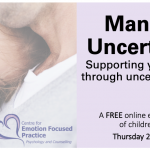PARENT TOOLKIT: MANAGING UNCERTAINTY IN CHILDREN
Life rarely goes to plan, and disruptions or changes are often unavoidable. Whether it’s moving house, changing jobs, divorce, bereavement, financial difficulties, or global pandemics, uncertainty is an inevitable part of life.
People often underestimate what young children, and even babies, notice in times of uncertainty and change. However, they can actually be very perceptive, and will often recognise small shifts in their routine, relationships and environment. This is because children are biologically wired to tune into the responses of their caregivers, including how they react or communicate, and where they are focusing their attention.
IDENTIFYING UNCERTAINTY IN CHILDREN
Research suggests that children and toddlers can identify uncertainty, even if they cannot yet describe what they are feeling. Rather than communicating that they are anxious or apprehensive, or asking for help, a child may respond in less obvious ways. You may notice they display their feelings of uncertainty through:
- Physical responses, e.g., tantrums, meltdowns, hitting, throwing or breaking items
- Emotional responses, e.g., crying, withdrawing, feelings of anger, frustration, fear or anxiety
- Behavioural responses, e.g., avoiding situations, hesitating, not following instructions, or not listening to parents or teachers
All of these responses are normal; however, they may pose challenges for you or your child in different contexts.
THE ROLE OF THE PARENT
Despite being able to recognise and respond to uncertainty, children do not yet possess the cognitive ability, life experience, or coping skills to deal with these situations effectively. For this reason, it is up to the adults in their lives to support them through uncertain times.
The skills needed to manage uncertainty are constantly developing throughout childhood. While the rate can vary significantly from child to child, it’s a good idea for parents to match their expectations of behaviour to their child’s age and developmental stage. This can help to avoid frustration, allow parents to teach their children age-appropriate skills, and to respond appropriately themselves.
Browse the following links for more information about what to expect in babies, toddlers, pre-schoolers, and school-age children.
HOW TO MANAGE UNCERTAINTY IN CHILDREN
We all struggle with uncertainty at different times. You may find the following tips useful to support your child through uncertainty or anxiety.
- Validate your child’s experience
 When you notice that your child is feeling anxious or uncertain, it’s important that you validate their experience and concerns. Talk to them about what is happening and try to understand what is going on for them. Let them know that it’s normal to feel this way and that you are there for them. Try to focus on what they are feeling, while resisting the urge to immediately “fix” or minimize their worries.
When you notice that your child is feeling anxious or uncertain, it’s important that you validate their experience and concerns. Talk to them about what is happening and try to understand what is going on for them. Let them know that it’s normal to feel this way and that you are there for them. Try to focus on what they are feeling, while resisting the urge to immediately “fix” or minimize their worries.
Learn more about the importance of validation here.
- Help them to recognise their emotions
 Children develop emotional literacy at different rates and stages. They may not yet have the words to describe what they are feeling, or ability to understand their emotions. You can help them to learn this by labelling their emotions out loud, asking them to draw how they are feeling, developing a feelings chart, or completing a ‘body scan’ with them.
Children develop emotional literacy at different rates and stages. They may not yet have the words to describe what they are feeling, or ability to understand their emotions. You can help them to learn this by labelling their emotions out loud, asking them to draw how they are feeling, developing a feelings chart, or completing a ‘body scan’ with them.
Browse these links to try a body scan or emotions chart at home.
- Model resilience and coping skills
 Children learn best through observation, so showing them what to do is usually more effective than telling them. Let them observe you talking about your emotions openly and using your own coping skills when you are stressed or overwhelmed. This way, you are showing them how to manage those feelings in healthy ways and empowering them to do the same.
Children learn best through observation, so showing them what to do is usually more effective than telling them. Let them observe you talking about your emotions openly and using your own coping skills when you are stressed or overwhelmed. This way, you are showing them how to manage those feelings in healthy ways and empowering them to do the same.
In situations where your child is feeling uncertain, it can be helpful to discuss times when you have felt uncertain yourself and how you managed to overcome it. Then, you can brainstorm possible solutions or coping strategies together.
- Provide a sense of control where possible
 Maintaining a relatively stable family routine is important for children to feel safe and secure. If they know what to expect for the important parts of their day (e.g., meals and bedtimes), they will have a higher tolerance for dealing with uncertainty in other areas. Providing structure and stability where possible allows them to thrive when faced with new environments or unexpected changes.
Maintaining a relatively stable family routine is important for children to feel safe and secure. If they know what to expect for the important parts of their day (e.g., meals and bedtimes), they will have a higher tolerance for dealing with uncertainty in other areas. Providing structure and stability where possible allows them to thrive when faced with new environments or unexpected changes.
When things feel overwhelming or uncertain, you can help your child to identify the things that they can control. You can also create additional opportunities for them to feel a sense of control, such as asking them what they would like to do or allowing them to make choices.
- Make sure you’re supported too
 It’s difficult to support your children if you are not taking care of yourself. Try to find small opportunities for downtime and self-care, and ensure you have people or professionals you can talk to about your own worries. When you prioritise your well-being and use healthy coping strategies, you are also modelling healthy habits to your child. Above all, be kind to yourself. Remember that you don’t have to be perfect and that it’s okay to make mistakes.
It’s difficult to support your children if you are not taking care of yourself. Try to find small opportunities for downtime and self-care, and ensure you have people or professionals you can talk to about your own worries. When you prioritise your well-being and use healthy coping strategies, you are also modelling healthy habits to your child. Above all, be kind to yourself. Remember that you don’t have to be perfect and that it’s okay to make mistakes.
Explore some self-care and self-compassion for parents.
WHEN TO SEEK PROFESSIONAL SUPPORT
Difficulties managing uncertainty are fairly typical, and many strategies can be implemented at home to support your child. Every child is different, but some signs that your child may need some extra supports are:
- They are having more frequent or intense tantrums than what is normal for them.
- They are becoming withdrawn and having trouble interacting with others.
- They are avoiding certain situations or enduring them with intense distress.
- They are behaving in ways that are dangerous to themselves or those around them.
If you’re worried about your child’s behaviour it’s a good idea to speak with a professional (e.g., GP, child care educator or teacher, maternal health nurse). If you are unsure where to start, the following links provide information about mental health services for children and the process of getting a mental health care plan.
OTHER RESOURCES YOU MAY FIND USEFUL
Videos:
- Webinar for parents: Managing uncertainty (psychologist Julie Chhouk explores how to identify and manage uncertainty in children from 18:05 – 27:15 mins)
Websites:
Seminars & Workshops:




